-
EXECUTIVE SUMMARY
-
MARKET INTRODUCTION
-
Definition
-
Scope of the Study
- Research Objective
- Assumptions
- Limitations
-
RESEARCH METHODOLOGY
-
Overview
-
Data Mining
-
Secondary Research
-
Primary Research
- Primary Interviews and
- Breakdown of Primary Respondents
-
Information Gathering Process
-
Forecasting Modality
-
Market Size Estimation
- Bottom-Up Approach
- Top-Down Approach
-
Data Triangulation
-
Validation
-
MARKET DYNAMICS
-
Overview
-
Drivers
-
Restraints
-
Opportunities
-
MARKET FACTOR ANALYSIS
-
Value Chain Analysis
-
Porter’s Five Forces
- Bargaining Power of Buyers
- Threat of New Entrants
- Threat of Substitutes
- Intensity of Rivalry
-
Analysis
-
Bargaining Power of Suppliers
-
COVID-19 Impact Analysis
- Regional Impact
- Opportunity and Threat Analysis
-
Market Impact Analysis
-
GLOBAL NUCLEAR MAGNETIC
-
RESONANCE NMR SPECTROMETER MARKET, BY PRODUCT
-
Overview
-
Instruments
-
Consumables
-
GLOBAL NUCLEAR MAGNETIC RESONANCE NMR SPECTROMETER
-
MARKET, BY TYPE
-
Overview
-
Low-field NMR Spectroscop
-
High-field NMR Spectroscopy
-
GLOBAL NUCLEAR MAGNETIC RESONANCE NMR SPECTROMETER
-
MARKET, BY END-USE
-
Overview
-
Academic
-
Pharmaceutical & Biotech Companies
-
Agriculture & Food
-
Chemical Industry
-
Others
-
GLOBAL NUCLEAR MAGNETIC
-
RESONANCE NMR SPECTROMETER MARKET, BY REGION
-
Overview
-
North America
- U.S.
- Canada
-
Europe
- Germany
- France
- U.K
- Italy
- Spain
- Rest of Europe
-
Asia-Pacific
- China
- India
- Japan
- South Korea
- Australia
- Rest of Asia-Pacific
-
Rest of the World
- Middle East
- Africa
- Latin America
-
COMPETITIVE LANDSCAPE
-
Overview
-
Competitive Analysis
-
Market Share Analysis
-
Major Growth Strategy
-
in the Global Nuclear magnetic resonance nmr spectrometer Market,
-
Competitive Benchmarking
-
Leading Players in Terms
- New Product Launch/Type Deployment
- Merger & Acquisitions
- Joint Ventures
-
of Number of Developments in the Global Nuclear magnetic resonance nmr spectrometer
-
Market,
-
Key developments and Growth Strategies
-
Major Players Financial
- Major Players R&D Expenditure. 2022
-
Matrix
-
Sales & Operating Income, 2022
-
COMPANY PROFILES
-
JEOL Ltd.
- Company Overview
- Financial Overview
- Products Offered
- Key Developments
- SWOT Analysis
- Key Strategies
-
Thermo Fisher Scientific
- Products Offered
- Key Developments
- SWOT Analysis
- Key Strategies
-
Inc
-
Company Overview
-
Financial Overview
-
Bruker
- Company Overview
- Financial Overview
- Products Offered
- Key Developments
- SWOT Analysis
- Key Strategies
-
Magritek
- Company Overview
- Financial Overview
- Products Offered
- Key Developments
- SWOT Analysis
- Key Strategies
-
Oxford Instruments
- Company Overview
- Financial Overview
- Products Offered
- Key Developments
- SWOT Analysis
- Key Strategies
-
NANALYSIS CORP.
- Company Overview
- Financial Overview
- Products Offered
- Key Developments
- SWOT Analysis
- Key Strategies
-
Anasazi Instruments,
- Products Offered
- Key Developments
- SWOT Analysis
- Key Strategies
-
Inc
-
Company Overview
-
Financial Overview
-
QOneTec
- Company Overview
- Financial Overview
- Products Offered
- Key Developments
- SWOT Analysis
- Key Strategies
-
Advanced Magnetic Resonance
- Products Offered
- Key Developments
- SWOT Analysis
- Key Strategies
-
Limited.
-
Company Overview
-
Financial Overview
-
APPENDIX
-
References
-
Related Reports
-
-
LIST OF TABLES
-
GLOBAL NUCLEAR MAGNETIC
-
RESONANCE NMR SPECTROMETER MARKET, SYNOPSIS, 2025 - 2034
-
GLOBAL NUCLEAR MAGNETIC
-
RESONANCE NMR SPECTROMETER MARKET, ESTIMATES & FORECAST, 2025 - 2034 (USD BILLION)
-
GLOBAL NUCLEAR MAGNETIC
-
RESONANCE NMR SPECTROMETER MARKET, BY PRODUCT, 2025 - 2034 (USD BILLION)
-
GLOBAL NUCLEAR MAGNETIC
-
RESONANCE NMR SPECTROMETER MARKET, BY TYPE, 2025 - 2034 (USD BILLION)
-
GLOBAL NUCLEAR MAGNETIC
-
RESONANCE NMR SPECTROMETER MARKET, BY END-USE, 2025 - 2034 (USD BILLION)
-
NORTH AMERICA NUCLEAR
-
MAGNETIC RESONANCE NMR SPECTROMETER MARKET, BY PRODUCT, 2025 - 2034 (USD BILLION)
-
NORTH AMERICA NUCLEAR
-
MAGNETIC RESONANCE NMR SPECTROMETER MARKET, BY TYPE, 2025 - 2034 (USD BILLION)
-
NORTH AMERICA NUCLEAR
-
MAGNETIC RESONANCE NMR SPECTROMETER MARKET, BY END-USE, 2025 - 2034 (USD BILLION)
-
NORTH AMERICA NUCLEAR
-
MAGNETIC RESONANCE NMR SPECTROMETER MARKET, BY COUNTRY, 2025 - 2034 (USD BILLION)
-
U.S. NUCLEAR MAGNETIC
-
RESONANCE NMR SPECTROMETER MARKET, BY PRODUCT, 2025 - 2034 (USD BILLION)
-
U.S. NUCLEAR MAGNETIC
-
RESONANCE NMR SPECTROMETER MARKET, BY TYPE, 2025 - 2034 (USD BILLION)
-
U.S. NUCLEAR MAGNETIC
-
RESONANCE NMR SPECTROMETER MARKET, BY END-USE, 2025 - 2034 (USD BILLION)
-
CANADA NUCLEAR MAGNETIC
-
RESONANCE NMR SPECTROMETER MARKET, BY PRODUCT, 2025 - 2034 (USD BILLION)
-
CANADA NUCLEAR MAGNETIC
-
RESONANCE NMR SPECTROMETER MARKET, BY TYPE, 2025 - 2034 (USD BILLION)
-
CANADA NUCLEAR MAGNETIC
-
RESONANCE NMR SPECTROMETER MARKET, BY END-USE, 2025 - 2034 (USD BILLION)
-
EUROPE NUCLEAR MAGNETIC
-
RESONANCE NMR SPECTROMETER MARKET, BY PRODUCT, 2025 - 2034 (USD BILLION)
-
EUROPE NUCLEAR MAGNETIC
-
RESONANCE NMR SPECTROMETER MARKET, BY TYPE, 2025 - 2034 (USD BILLION)
-
EUROPE NUCLEAR MAGNETIC
-
RESONANCE NMR SPECTROMETER MARKET, BY END-USE, 2025 - 2034 (USD BILLION)
-
EUROPE NUCLEAR MAGNETIC
-
RESONANCE NMR SPECTROMETER MARKET, BY COUNTRY, 2025 - 2034 (USD BILLION)
-
GERMANY NUCLEAR MAGNETIC
-
RESONANCE NMR SPECTROMETER MARKET, BY PRODUCT, 2025 - 2034 (USD BILLION)
-
GERMANY NUCLEAR MAGNETIC
-
RESONANCE NMR SPECTROMETER MARKET, BY TYPE, 2025 - 2034 (USD BILLION)
-
GERMANY NUCLEAR MAGNETIC
-
RESONANCE NMR SPECTROMETER MARKET, BY END-USE, 2025 - 2034 (USD BILLION)
-
FRANCE NUCLEAR MAGNETIC
-
RESONANCE NMR SPECTROMETER MARKET, BY PRODUCT, 2025 - 2034 (USD BILLION)
-
FRANCE NUCLEAR MAGNETIC
-
RESONANCE NMR SPECTROMETER MARKET, BY TYPE, 2025 - 2034 (USD BILLION)
-
FRANCE NUCLEAR MAGNETIC
-
RESONANCE NMR SPECTROMETER MARKET, BY END-USE, 2025 - 2034 (USD BILLION)
-
ITALY NUCLEAR MAGNETIC
-
RESONANCE NMR SPECTROMETER MARKET, BY PRODUCT, 2025 - 2034 (USD BILLION)
-
ITALY NUCLEAR MAGNETIC
-
RESONANCE NMR SPECTROMETER MARKET, BY TYPE, 2025 - 2034 (USD BILLION)
-
ITALY NUCLEAR MAGNETIC
-
RESONANCE NMR SPECTROMETER MARKET, BY END-USE, 2025 - 2034 (USD BILLION)
-
SPAIN NUCLEAR MAGNETIC
-
RESONANCE NMR SPECTROMETER MARKET, BY PRODUCT, 2025 - 2034 (USD BILLION)
-
SPAIN NUCLEAR MAGNETIC
-
RESONANCE NMR SPECTROMETER MARKET, BY TYPE, 2025 - 2034 (USD BILLION)
-
SPAIN NUCLEAR MAGNETIC
-
RESONANCE NMR SPECTROMETER MARKET, BY END-USE, 2025 - 2034 (USD BILLION)
-
U.K NUCLEAR MAGNETIC
-
RESONANCE NMR SPECTROMETER MARKET, BY PRODUCT, 2025 - 2034 (USD BILLION)
-
U.K NUCLEAR MAGNETIC
-
RESONANCE NMR SPECTROMETER MARKET, BY TYPE, 2025 - 2034 (USD BILLION)
-
U.K NUCLEAR MAGNETIC
-
RESONANCE NMR SPECTROMETER MARKET, BY END-USE, 2025 - 2034 (USD BILLION)
-
REST OF EUROPE NUCLEAR
-
MAGNETIC RESONANCE NMR SPECTROMETER MARKET, BY PRODUCT, 2025 - 2034 (USD BILLION)
-
REST OF EUROPE NUCLEAR
-
MAGNETIC RESONANCE NMR SPECTROMETER MARKET, BY TYPE, 2025 - 2034 (USD BILLION)
-
REST OF EUROPE NUCLEAR
-
MAGNETIC RESONANCE NMR SPECTROMETER MARKET, BY END-USE, 2025 - 2034 (USD BILLION)
-
ASIA PACIFIC NUCLEAR
-
MAGNETIC RESONANCE NMR SPECTROMETER MARKET, BY PRODUCT, 2025 - 2034 (USD BILLION)
-
ASIA PACIFIC NUCLEAR
-
MAGNETIC RESONANCE NMR SPECTROMETER MARKET, BY TYPE, 2025 - 2034 (USD BILLION)
-
ASIA PACIFIC NUCLEAR
-
MAGNETIC RESONANCE NMR SPECTROMETER MARKET, BY END-USE, 2025 - 2034 (USD BILLION)
-
ASIA PACIFIC NUCLEAR
-
MAGNETIC RESONANCE NMR SPECTROMETER MARKET, BY COUNTRY, 2025 - 2034 (USD BILLION)
-
JAPAN NUCLEAR MAGNETIC
-
RESONANCE NMR SPECTROMETER MARKET, BY PRODUCT, 2025 - 2034 (USD BILLION)
-
JAPAN NUCLEAR MAGNETIC
-
RESONANCE NMR SPECTROMETER MARKET, BY TYPE, 2025 - 2034 (USD BILLION)
-
JAPAN NUCLEAR MAGNETIC
-
RESONANCE NMR SPECTROMETER MARKET, BY END-USE, 2025 - 2034 (USD BILLION)
-
CHINA NUCLEAR MAGNETIC
-
RESONANCE NMR SPECTROMETER MARKET, BY PRODUCT, 2025 - 2034 (USD BILLION)
-
CHINA NUCLEAR MAGNETIC
-
RESONANCE NMR SPECTROMETER MARKET, BY TYPE, 2025 - 2034 (USD BILLION)
-
CHINA NUCLEAR MAGNETIC
-
RESONANCE NMR SPECTROMETER MARKET, BY END-USE, 2025 - 2034 (USD BILLION)
-
INDIA NUCLEAR MAGNETIC
-
RESONANCE NMR SPECTROMETER MARKET, BY PRODUCT, 2025 - 2034 (USD BILLION)
-
INDIA NUCLEAR MAGNETIC
-
RESONANCE NMR SPECTROMETER MARKET, BY TYPE, 2025 - 2034 (USD BILLION)
-
INDIA NUCLEAR MAGNETIC
-
RESONANCE NMR SPECTROMETER MARKET, BY END-USE, 2025 - 2034 (USD BILLION)
-
AUSTRALIA NUCLEAR
-
MAGNETIC RESONANCE NMR SPECTROMETER MARKET, BY PRODUCT, 2025 - 2034 (USD BILLION)
-
AUSTRALIA NUCLEAR
-
MAGNETIC RESONANCE NMR SPECTROMETER MARKET, BY TYPE, 2025 - 2034 (USD BILLION)
-
AUSTRALIA NUCLEAR
-
MAGNETIC RESONANCE NMR SPECTROMETER MARKET, BY END-USE, 2025 - 2034 (USD BILLION)
-
SOUTH KOREA NUCLEAR
-
MAGNETIC RESONANCE NMR SPECTROMETER MARKET, BY PRODUCT, 2025 - 2034 (USD BILLION)
-
SOUTH KOREA NUCLEAR
-
MAGNETIC RESONANCE NMR SPECTROMETER MARKET, BY TYPE, 2025 - 2034 (USD BILLION)
-
SOUTH KOREA NUCLEAR
-
MAGNETIC RESONANCE NMR SPECTROMETER MARKET, BY END-USE, 2025 - 2034 (USD BILLION)
-
REST OF ASIA-PACIFIC
-
NUCLEAR MAGNETIC RESONANCE NMR SPECTROMETER MARKET, BY PRODUCT, 2025 - 2034 (USD
-
BILLION)
-
TABLE
-
REST OF ASIA-PACIFIC NUCLEAR MAGNETIC RESONANCE NMR SPECTROMETER MARKET, BY TYPE,
-
REST OF ASIA-PACIFIC NUCLEAR MAGNETIC RESONANCE NMR SPECTROMETER
-
MARKET, BY END-USE, 2025 - 2034 (USD BILLION)
-
REST OF WORLD NUCLEAR MAGNETIC RESONANCE
-
NMR SPECTROMETER MARKET, BY PRODUCT, 2025 - 2034 (USD BILLION)
-
REST OF WORLD NUCLEAR
-
MAGNETIC RESONANCE NMR SPECTROMETER MARKET, BY TYPE, 2025 - 2034 (USD BILLION)
-
REST OF WORLD NUCLEAR
-
MAGNETIC RESONANCE NMR SPECTROMETER MARKET, BY END-USE, 2025 - 2034 (USD BILLION)
-
REST OF WORLD NUCLEAR
-
MAGNETIC RESONANCE NMR SPECTROMETER MARKET, BY COUNTRY, 2025 - 2034 (USD BILLION)
-
MIDDLE EAST NUCLEAR
-
MAGNETIC RESONANCE NMR SPECTROMETER MARKET, BY PRODUCT, 2025 - 2034 (USD BILLION)
-
MIDDLE EAST NUCLEAR
-
MAGNETIC RESONANCE NMR SPECTROMETER MARKET, BY TYPE, 2025 - 2034 (USD BILLION)
-
MIDDLE EAST NUCLEAR
-
MAGNETIC RESONANCE NMR SPECTROMETER MARKET, BY END-USE, 2025 - 2034 (USD BILLION)
-
AFRICA NUCLEAR MAGNETIC
-
RESONANCE NMR SPECTROMETER MARKET, BY PRODUCT, 2025 - 2034 (USD BILLION)
-
AFRICA NUCLEAR MAGNETIC
-
RESONANCE NMR SPECTROMETER MARKET, BY TYPE, 2025 - 2034 (USD BILLION)
-
AFRICA NUCLEAR MAGNETIC
-
RESONANCE NMR SPECTROMETER MARKET, BY END-USE, 2025 - 2034 (USD BILLION)
-
LATIN AMERICA NUCLEAR
-
MAGNETIC RESONANCE NMR SPECTROMETER MARKET, BY PRODUCT, 2025 - 2034 (USD BILLION)
-
LATIN AMERICA NUCLEAR
-
MAGNETIC RESONANCE NMR SPECTROMETER MARKET, BY TYPE, 2025 - 2034 (USD BILLION)
-
LATIN AMERICA NUCLEAR
-
MAGNETIC RESONANCE NMR SPECTROMETER MARKET, BY END-USE, 2025 - 2034 (USD BILLION)
-
LIST OF FIGURES
-
RESEARCH PROCESS
-
MARKET STRUCTURE FOR
-
THE GLOBAL NUCLEAR MAGNETIC RESONANCE NMR SPECTROMETER MARKET
-
MARKET DYNAMICS FOR
-
THE GLOBAL NUCLEAR MAGNETIC RESONANCE NMR SPECTROMETER MARKET
-
GLOBAL NUCLEAR MAGNETIC
-
RESONANCE NMR SPECTROMETER MARKET, SHARE (%), BY PRODUCT, 2022
-
GLOBAL NUCLEAR MAGNETIC
-
RESONANCE NMR SPECTROMETER MARKET, SHARE (%), BY TYPE, 2022
-
GLOBAL NUCLEAR MAGNETIC
-
RESONANCE NMR SPECTROMETER MARKET, SHARE (%), BY END-USE, 2022
-
GLOBAL NUCLEAR MAGNETIC
-
RESONANCE NMR SPECTROMETER MARKET, SHARE (%), BY REGION, 2022
-
NORTH AMERICA: NUCLEAR
-
MAGNETIC RESONANCE NMR SPECTROMETER MARKET, SHARE (%), BY REGION, 2022
-
EUROPE: NUCLEAR MAGNETIC
-
RESONANCE NMR SPECTROMETER MARKET, SHARE (%), BY REGION, 2022
-
ASIA-PACIFIC: NUCLEAR
-
MAGNETIC RESONANCE NMR SPECTROMETER MARKET, SHARE (%), BY REGION, 2022
-
REST OF THE WORLD:
-
NUCLEAR MAGNETIC RESONANCE NMR SPECTROMETER MARKET, SHARE (%), BY REGION, 2022
-
GLOBAL NUCLEAR MAGNETIC
-
RESONANCE NMR SPECTROMETER MARKET: COMPANY SHARE ANALYSIS, 2022 (%)
-
JEOL LTD.: FINANCIAL
-
OVERVIEW SNAPSHOT
-
JEOL LTD.: SWOT ANALYSIS
-
THERMO FISHER SCIENTIFIC INC: FINANCIAL
-
OVERVIEW SNAPSHOT
-
THERMO FISHER SCIENTIFIC INC: SWOT ANALYSIS
-
BRUKER: FINANCIAL
-
OVERVIEW SNAPSHOT
-
BRUKER: SWOT ANALYSIS
-
MAGRITEK: FINANCIAL OVERVIEW SNAPSHOT
-
MAGRITEK: SWOT ANALYSIS
-
OXFORD INSTRUMENTS.:
-
FINANCIAL OVERVIEW SNAPSHOT
-
OXFORD INSTRUMENTS.: SWOT ANALYSIS
-
NANALYSIS CORP.:
-
FINANCIAL OVERVIEW SNAPSHOT
-
NANALYSIS CORP.: SWOT ANALYSIS
-
ANASAZI INSTRUMENTS, INC: FINANCIAL OVERVIEW
-
SNAPSHOT
-
FIGURE
-
ANASAZI INSTRUMENTS, INC: SWOT ANALYSIS
-
QONETEC: FINANCIAL OVERVIEW SNAPSHOT
-
QONETEC: SWOT ANALYSIS
-
FIGURE
-
ADVANCED MAGNETIC RESONANCE LIMITED.: FINANCIAL OVERVIEW SNAPSHOT
-
ADVANCED MAGNETIC
-
RESONANCE LIMITED.: SWOT ANALYSIS


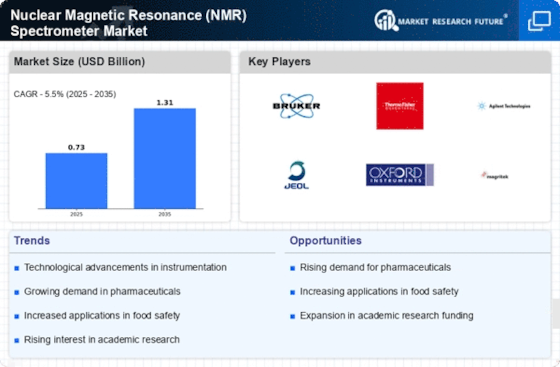

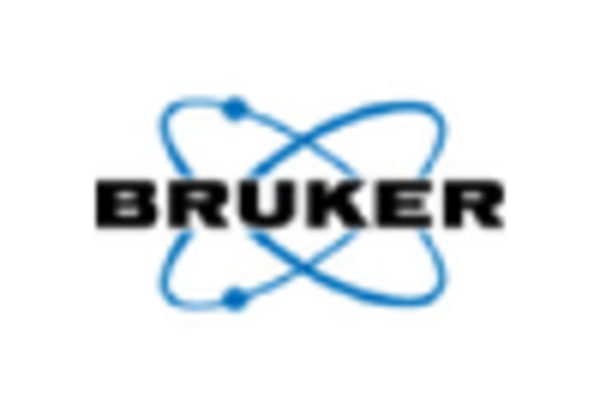
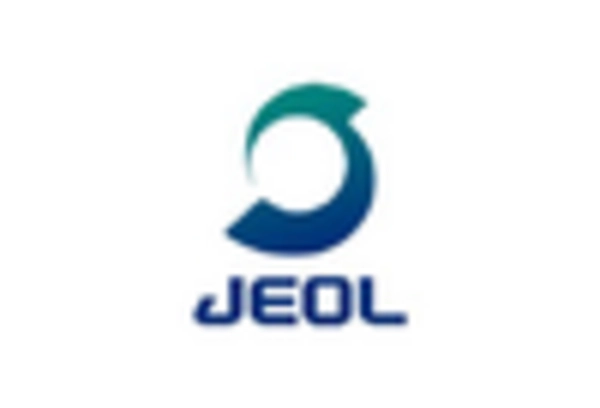
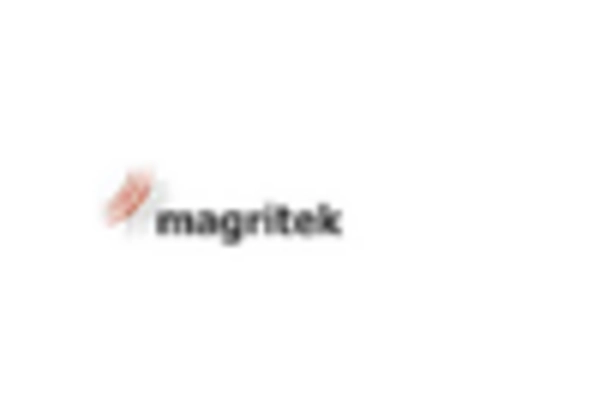
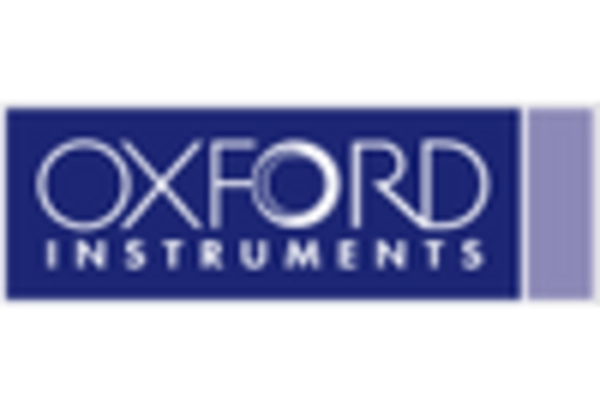










Leave a Comment